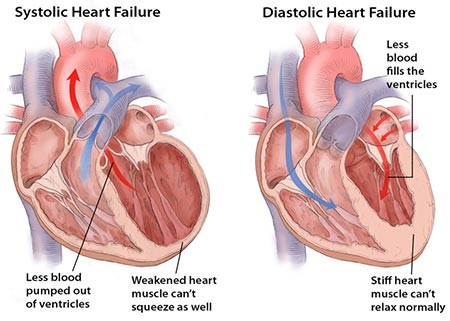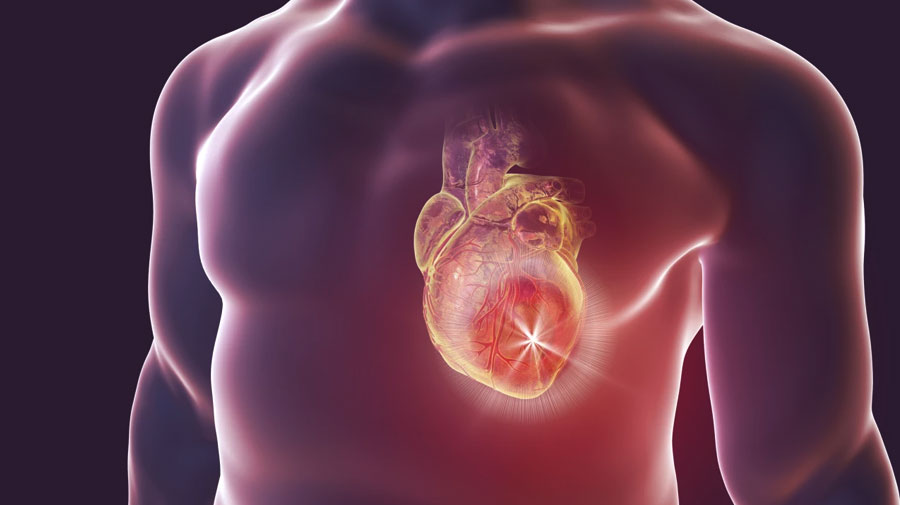These days it is becoming increasingly common for people to suffer from heart diseases. No matter the age, congestive heart failure can be seen in every category. (Comp.utm.my) The primary factor for the same is a lifestyle. People are consuming more fast food than ever, performing lesser exercises and are always stressed.
Table of Contents
What is congestive heart failure?
Heart failure does not mean that the heart has stopped functioning; it means that the heart is operating less efficiently. The function of the heart is to pump oxygen and nutrients through the blood to various organs.
Sometimes, the blood moves through the body and heart at a slower rate. This increases the pressure on the heart and causes the heart to pump lesser blood to other organs. The heart either stretches or stiffens up to hold more blood in its chambers. It regulates the blood circulation, but eventually, heart muscles may become weak hindering efficient pumping.
As a result, the kidneys cause the body to retain fluid and salt. If the fluid or water collects in the arms, ankles, legs, lungs, or other organs, the body becomes congested.
This phenomenon is termed as congestive heart failure.
What are the types of congestive heart failure?

There are two types of heart failure: systolic dysfunction and diastolic dysfunction.
In systolic dysfunction, the heart does not contract with adequate force. As a result, the heart does not pump enough blood to the body. However, in diastolic dysfunction, it is not the heart but the ventricles that do not relax properly. In such a case, less blood enters the heart.
What causes congestive heart failure?
- Coronary artery disease: When the small arteries or coronary arteries that supply blood to the heart narrow down or get blocked, the blood flow is decreased. This may damage these arteries. This condition is termed as coronary artery disease. When a coronary artery is completely blocked restricting blood flow, it can cause a heart attack.
- Faulty heart valves: The function of heart valves is to regulate blood flow in the heart. Disrupted heart flow might overwork the heart causing congestive heart failure.
- Hypertension: High blood pressure or hypertension forces the heart to work harder to maintain healthy blood flow in the body. This may stiffen up the heart muscles, causing them permanent damage.
- Myocarditis: Due to some infections, the muscles of the heart might get inflamed. This can lead to left-sided heart failure.
- Damage to heart muscles: The damage can occur due to genetics, drug abuse, alcohol abuse and certain infections.
- Congenital heart defects: Some people are born with heart defects like underdeveloped heart chambers or valves. This causes the healthier part of the heart to function more, which can trigger congestive heart failure.
- Abnormal heart rhythms: Too fast or too slow heartbeats will pressure your heart to work extra to balance the pulse.
- Sleep apnea: Some people are not able to breathe properly while sleeping which leads to lack of oxygen and irregular heartbeats. These conditions might weaken the heart.
- Other medical factors: Hypothyroidism, diabetes, HIV, buildup of iron or protein, and improper functioning of kidney or lungs may also lead to congestive heart failure. Some medications also weaken the heart.
- Lifestyle factors: Smoking, obesity and lack of exercises may affect the oxygen level in the body. Some people eat more salt which leads to fluid retention. This might provoke heart to work more causing heart diseases.
What are the symptoms of congestive heart failure?

- Fluid Retention: If a person experiences water retention, they will have swollen abdomen, ankles and legs. They may gain weight rapidly. People also undergo frequent urination during the night if the body is retaining fluid which is due to less blood flow to the kidneys. Water retention in the abdomen causes nausea and loss of appetite.
- Congested lungs: When a person?s lungs hold fluid, they will feel shortness of breath while exercising and difficulty in breathing while lying on a bed. Congested lungs also cause wheezing and dry cough.
- Weakness, fatigue and dizziness: When the blood flow is less than normal, a person?s body feels constantly tired. The lack of blood in the brain will cause dizziness or confusion.
- Symptoms in children or infants: The toddlers will experience difficulty in breathing, excessive sweating and loss of appetite.
How is congestive heart failure diagnosed?
Once the doctor knows the person?s symptoms, they will ask the person to visit a cardiologist. First and foremost, the cardiologist will try to detect a normal heartbeat using a stethoscope. In case the expert detects something unusual, the person will be asked to take certain medical tests.
- Electrocardiogram (ECG): This records the heart?s rhythm. Irregular heart rhythm or rapid heartbeats might signify that the walls of the heart?s chamber have become thicker.
- MRI: This is performed to take still and moving pictures of the heart which reveals if there is any damage in the heart.
- Echocardiogram: The test is done to determine if the person has poor blood flow, or damaged heart muscles. Sound waves are used to record a person?s heart?s motion and structure.
- Blood test: These tests are done to gather if the person has any infections. The test also checks the hemoglobin level, thyroid level and cholesterol level. B-type natriuretic peptide (BNP) blood test may also be done to know if there is a lack of oxygen level in the blood.
- Stress test: In this test, the doctor detects complication by placing the heart under different levels of stress.
- Cardiac catheterization: This test will help the doctor in knowing if there are any blockages in the arteries.
How can you prevent congestive heart failure?

1. Avoid Smoking
Smoking or abusing tobacco in any form is the primary reason for developing heart diseases. The chemicals present in tobacco may lead to a buildup of plaque that will narrow down the arteries, damaging the heart.
The smoke of cigarettes contains carbon monoxide. Some of the oxygen gets replaced by carbon monoxide. As a result, blood pressure and heart rate increase causing the heart to work harder.
No amount of smoking is considered as safe. Even passive smoking or occasional smoking is harmful. Low-nicotine cigarettes also cause harm. But the good news is that once you stop smoking, in just a year, your risk of developing a heart disease falls to that of a non-smoker.
2. Exercise regularly
Everyone knows how important is exercising. Apart from keeping the body weight under control, exercising also keeps high cholesterol level, diabetes and high blood pressure at bay. Regular physical activity reduces the chances of developing a condition that burdens the heart.
And by physical activity, it does not mean that a person needs to exercise an hour every day. Even brisk walking for 30 minutes on 5-6 days a week is enough. 300 minutes of moderate activity or 150 minutes of vigorous activity will reap you more health benefits.
If you are not able to take out 30 minutes out of your schedule, perform 10 minutes exercise three times a day. As little as gardening, dog walking, taking the stairs and housekeeping also count as physical activity. Keeping your heart healthy by exercising isn?t that difficult, after all.
3. Consume a heart-healthy diet
Eating healthy has different definitions for different diseases. For heart health, it is necessary to avoid food that is rich in sugar, salt and trans fats. You should eat fruits, whole grains and vegetables to follow a healthy diet. Lean meats, fish, low-fat dairy products and beans will contribute as well.
You should be limiting or altogether avoid the intake of saturated fats and trans fats. Your fat consumption should not exceed 5-6% of your daily calorie intake.
A person should take 5-10 servings of fruits and vegetable in a day. Eating salmon or tuna is also recommended. Avoiding excessive consumption of alcohol is a must. Healthy alcohol intake is one drink a day for women of all age groups and men older than 65 years, while men below 65 years can have two drinks in a day. One drink does not mean you can pour yourself a full glass of wine; the limit is 148 ml for wine. For those who like beer, 350 ml makes one drink.
4. Maintain a healthy weight

Metabolic syndrome, a combination of high cholesterol, high blood sugar, high blood pressure and obesity, is more likely to develop if a person has fats in their tummy area. This condition causes diabetes and heart diseases. An overweight man will have above 40 inches of the waistline, whereas an obese woman will have more than 38 inches as her waistline.
Therefore, maintaining a healthy weight becomes very necessary. Even a 3-5% loss in body fats will make a huge difference in blood sugar level, blood pressure levels and cholesterol.
5. Get adequate sound sleep
People who do not sleep enough are more likely to develop obesity, heart attack, high blood pressure and depression. The average adult requirement of sleep is seven to nine hours. If you wake up feeling refreshed, you are getting adequate sleep.
Apart from sleeping enough, maintaining a regular sleep cycle is also important. If you have trouble falling asleep, then, keep your room dark and quiet.
6. Have regular health checkups
High blood pressure, diabetes and high cholesterol level damage your heart. But you will probably not realize if you have any of these conditions until you get yourself checked regularly. In case you already have any of these conditions, monitor their readings and medication. Visit your doctor regularly. Elevated levels will cause irreversible damage.
7. Practice de-stressing activities regularly
Stress has become the number one cause of any disease. Increased stress elevates blood pressure, which may lead to stroke. Stress also hampers sound sleep. Therefore, practicing de-stressing activities like meditation, yoga, listening to soothing music, etc. becomes imperative.
Managing your health is crucial, especially if you’re dealing with congestive heart failure. A Portable Oxygen Concentrator can provide the support you need, allowing you to breathe easier and go about your daily activities more comfortably.


